Waiting for "Mark Zero"
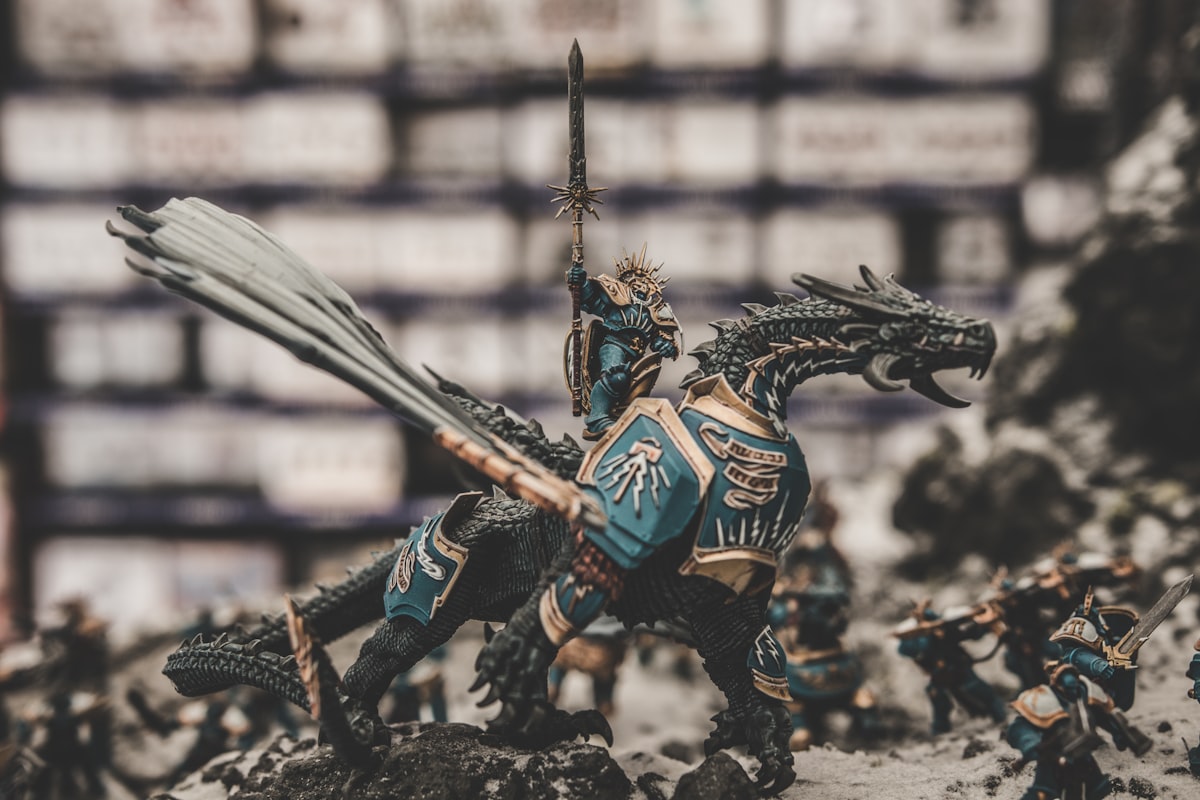
A meditation on a favorite pulp novel
I woke up on my birthday to see a bridge collapsing. My wife was watching it on her iPad.
"You've got to see this. There's been an accident" she said. I watched the video from start to finish. Then she said in a more anxious tone, "I didn't think things like this were possible. What do you think this means?"
I didn't have a good answer for her. Certainly the first phrase that came to mind was "competency crisis". But the second was "Calth".
Calth.
I remember repeating the word back to myself in the car ride to work. Calth is a reference to a planet from the Warhammer 40k universe, prominently featured in Dan Abnet's novel Know No Fear. Longtime readers of the blog may recognize this title from Morgoth's short article, The Curtain Opens On 2024, which referenced that story. And indeed it will come as no surprise to many readers that I share Morgoth's opinion that this entry in the Horus Heresy is one of the series' most evocative.
And something of that novel remained with me alongside Morgoth's prophecy that the events of 2024 would unfold in a similar manner to those of Dan Abnett's book: a slow creeping sense of foreboding, with bad turns building into a sudden break point and then mayhem. As Morgoth writes:
It’s all a bit humdrum. Then, the cargo ship begins increasing the speed at which it is approaching the giant dockyard in orbit above the planet. Somebody will have to explain protocol to the captain. No response. It increases its velocity. No response. Down on the surface weapons are being fired and communications are breaking down. Above, the cargo ship is now approaching lightspeed and it is heading for the giant dockyard containing an entire fleet of battleships. The Astartes soldiers on the surface are now under siege by the traitors and above the cargo ship slams into the dockyard. Battleships five miles long begin to drop through orbit, out of the sky, slamming into the ground below creating tidal waves and earthquakes as the beleaguered soldiers look up at the carnage in astonishment.
I suppose a nearby bridge collapsing isn't exactly the same thing as gargantuan starships falling out of the sky and leveling cities, but it seemed to rhyme. Like in the events of Dan Abnett's novel, something was happening. And my imagination couldn't help but return once more to the events of Know No Fear.
Warhammer 40k has always been a guilty pleasure of mine, and I am certainly not alone. I can't defend these novels as anything approaching serious science fiction, let alone serious literature. Like most modern fiction based on a franchise, the authors start stories that allude to broader philosophical themes but lack the discipline to complete the arc in a satisfactory way. But because the material draws on broader historical influences, certain gems of insight can be mined.
For those unfamiliar with the particulars of the Warhammer 40k Universe (the events of the Horus Hersey in particular), the plot concerns a distant future humanity spread among the stars, beset by nightmarish alien races, and brought together only by the beneficence of a superhuman being known only as "The Emperor" who defends humanity via his legions of smaller superhuman “Space Marines” (or “Astartes”) each led by one of his twenty sons, called "Primarchs".
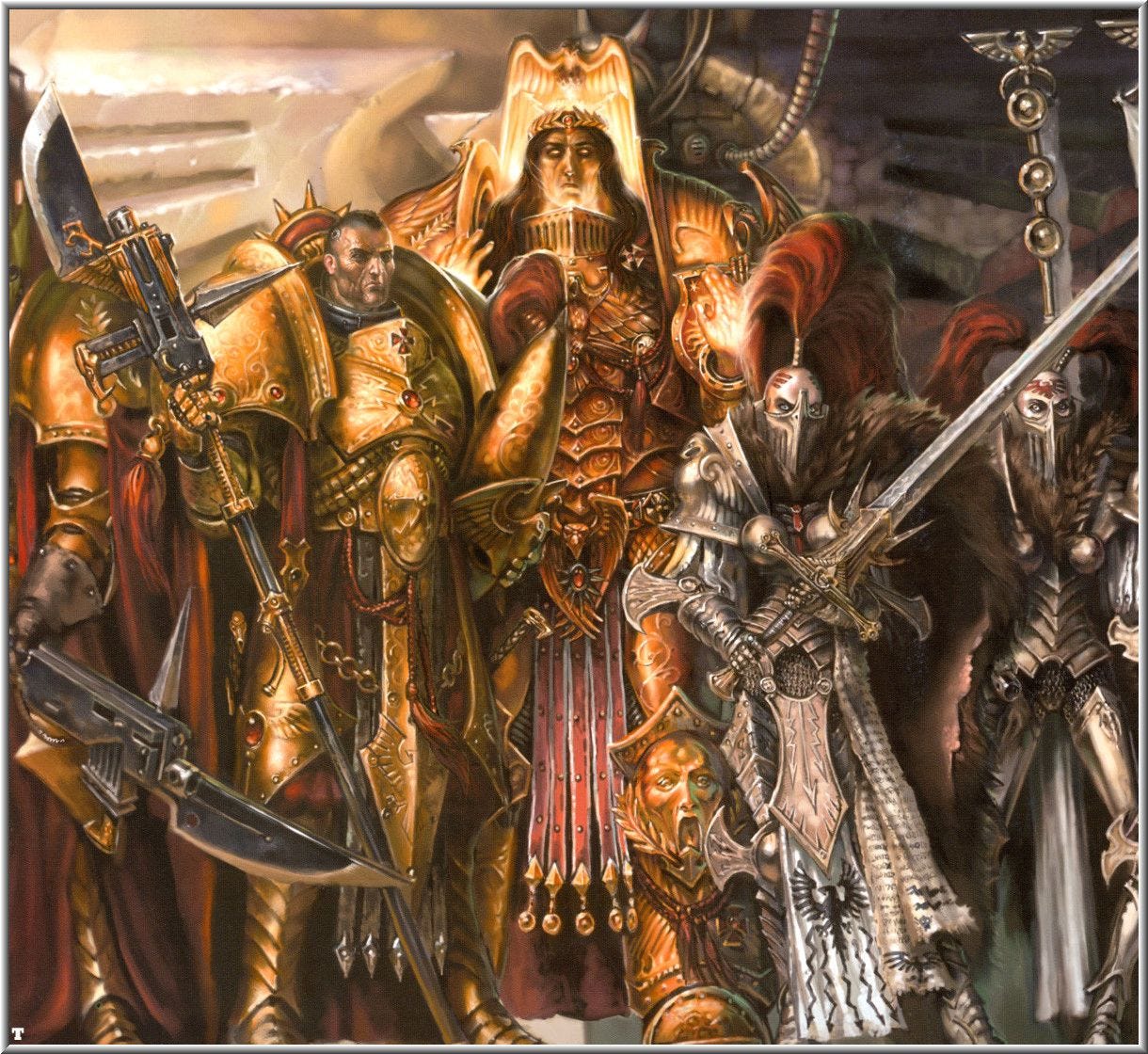
At first humanity seems to be on the verge of forging a Golden age in the heart of an unimaginably hostile universe, saved from an otherwise gruesome fate by the Emperor and his sons. But contradictions begin to emerge. Far from a band of brothers each embodying a different human strength, the Emperor and his Primarchs end up in an uncomfortable alliance with each other, housing jarring ideological disagreements deriving from the personal flaws of the Primarchs themselves.
Furthermore, far from a reign of total enlightenment, the order that the Emperor designs to rule humanity is built on lies and half truths. Elements of spiritual truth the Emperor considers to be dangerous are suppressed, while pacifying lies about a progressive technocratic future are pushed despite its manifest impossibility.
As it turns out, the Emperor's victory will not be shared equally among all humanity, not even equally among the Primarchs. There will be winners and losers, and in whatever new ordering is birthed, justice and truth will not be necessary pillars.
Initially the dissatisfied legions of Space Marines attempt to suppress their dissent internally, but cracks emerge. Then, as their leaders are tempted by the malign spiritual entities that the Emperor denies, half of the Primarchs openly defect, conflict erupts, and the galaxy is plunged into unending civil war.
The Warhammer universe is epic in scope and theme, but it's surprisingly hard to write good fiction in the setting. Part of the problem is that the main characters, the "Space Marines" or "Astartes", are semi-immortal beings that care only about war. As part of their transformation into super-soldiers, the Space Marines lose most of the emotions that ordinary humans experience in conflict settings. Space Marines don't have families beyond their battle brothers, they "feel no pain", "know no fear", and their ability to experience normal anxiety is greatly reduced.
Furthermore, for the novels set during the "Horus Heresy" (of which Know No Fear is an entry), there is the additional narrative barrier in that the events comprise a prequel. The facts have already been delivered to the audience as prologue to the universe's main plot-line. All fans know how the Horus Heresy ends, with the traitors defeated and the Emperor mortally wounded. And most fans of Warhammer also know that the battle of Calth resulted in a stalemate that cost the traitors dearly despite their initial advantage.
Yet Dan Abnett makes the story of Calth work well by framing the narrative as a countdown to the decisive moment in the battle. Framing the conflict as a psychological game of chicken between the two belligerent commanders: Roboute Guilliman and Lorgar Aurelian. The stark contrast between these men’s minds and philosophical outlooks playing out on the battlefield; the essential flaw in each epic personality unwinding into an ultimately tragic conclusion.
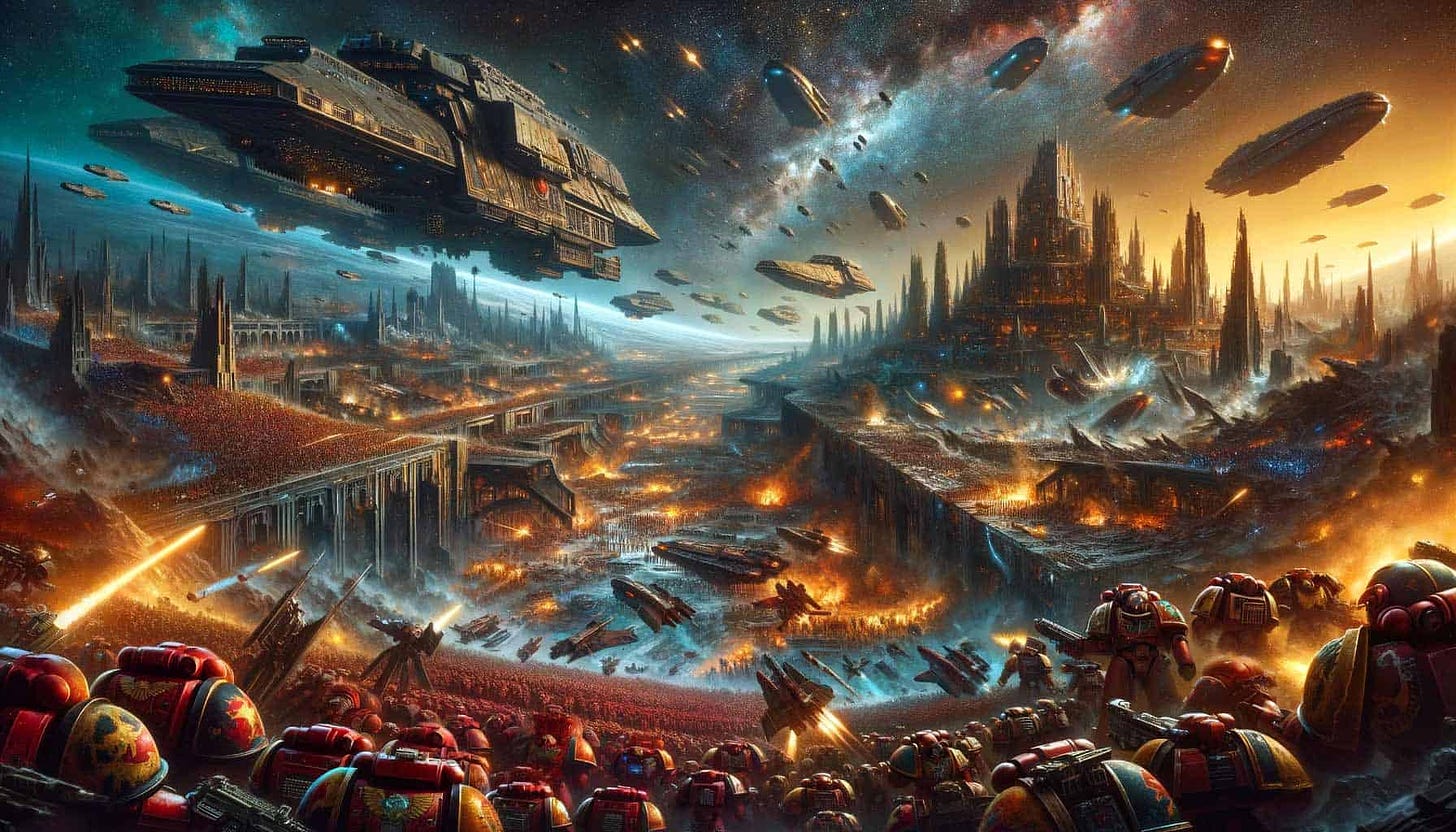
To start with the loyalist leader, the Primarch of the “Ultramarines”, and the commander of the 13th Legion, Roboute Guilliman remains a strangely unlikable character despite his heroic disposition. An intrepid warrior, tactical genius, and loyal to a fault, not only is Guilliman an archetypal “by-the-book” good cop, he literally wrote the codex of rules the other Space Marines follow. Roboute Guilliman is a believer in the Emperors vision of humanity to the point where its fundamental contradictions are regarded as a inconvenient detail. Aware of his brothers many objections, Guilliman seems to believe, at some level, that if everyone just complied hard enough and got with the program the issues would resolve themselves. Sure there might be truth to his opponents objections, but isn’t truth secondary to loyalty and subordinate to the desire to not rock the boat?
To use modern internet parlance, Guilliman is a spiritual Boomer. You can almost hear him telling the other legions to “man up” when they pose their initial complaints.
By contrast, Guilliman’s traitorous Brother, Lorgar Aurellian, Primarch of the Word Bearers, and leader of the Seventeenth legion, is oddly compelling even though he is, by any definition, a pretty bad dude. Still, his objections to the Emperors new order lies closest to the roots of the Imperium’s problems. Fearing that knowledge of the esoteric will be corrupting, the Emperor rejects religion and spirituality wholesale, hoping that a noble lie will be better for the species in the long run. The lie is made more prominent because both Lorgar and the Emperor know secularism is an impossibility, making the search for true religion and implicit necessity for mankind’s future. Perhaps the Emperor believes humanity will address this issue in a more advanced age, but Lorgar finds the present contradiction unbearable. As the Primarch recounts his own disillusionment, he begins by speaking the words: “All I ever wanted was the truth.”
The search for truth is certainly a noble pursuit. But in the pattern of many spurned sons, Lorgar tosses wisdom to the wind and heads in the opposite direction of his father out of spite. The quest eventually brings Lorgar and his legion to “The Eye of Terror” to beseech the emperor’s arch-enemies, the gods of Chaos, for spiritual direction. And from this dark communion Lorgar and his legion are transformed from religious objectors to fanatical crusaders who will stop at nothing to feed the souls of humanity into the gaping mouth of hell.
Subsequently, Lorgar brings the other dissident Astartes a new demonic religion which binds the myriad disaffected legions together under the banner of the Warmaster Horus. An so the Galaxy’s civil War, the “Horus Hersey” begins in earnest.
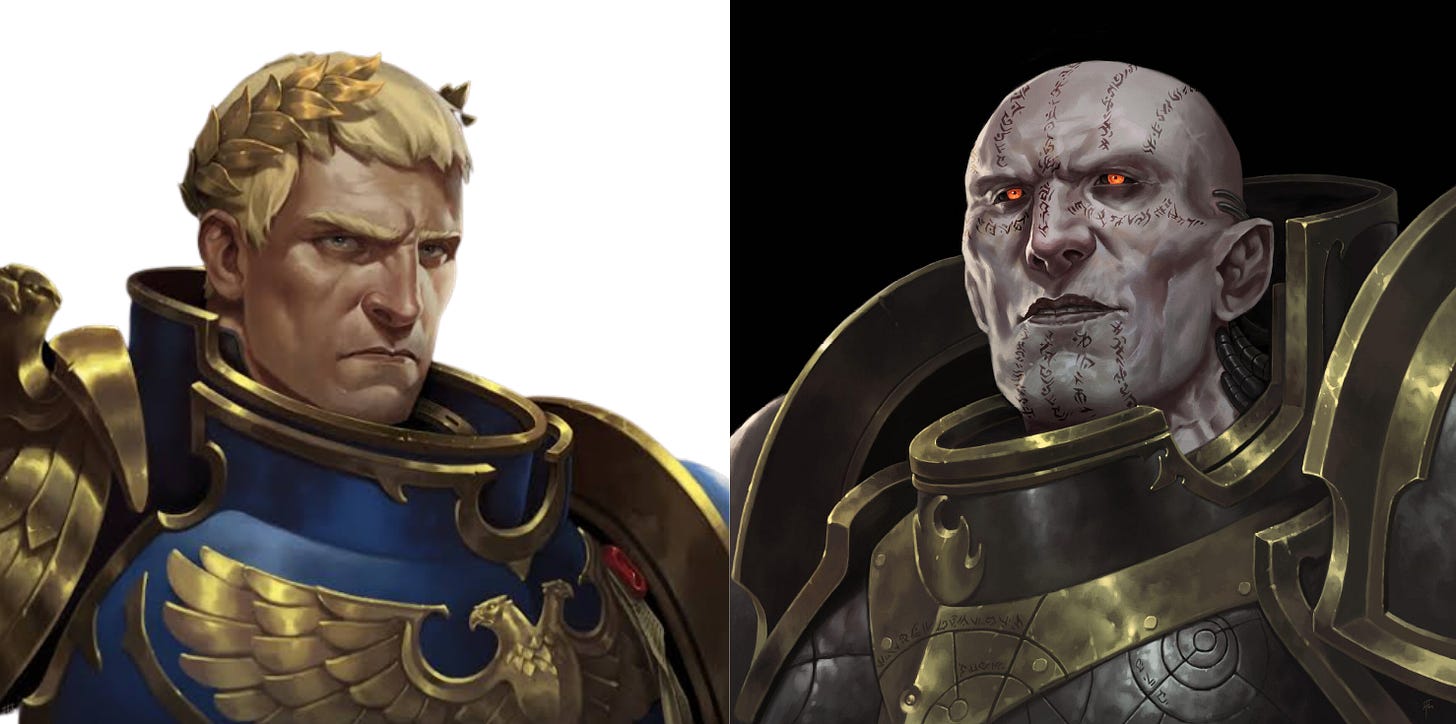
This naturally brings us to the battle of Calth described in Abnett’s Know No Fear which pits the arch-traitor Lorgar against the eternal loyalist, Guilliman. The great advantage of the traitors is the element of surprise. A galaxy-wide warp storm contrived by the dark gods, allows the heretics to unroll the first theater of battle as a series of sneak attacks against the loyalist legions ahead of their eventual attack on the Emperor himself.
On Calth this deception works to deadly effect. Since Guilleman is completely unwilling to believe that any of his brothers would betray their father, he will accept nothing less than definitive proof of malfeasance. Knowing this, Lorgar sets up the initial strike to look like an accident caused by the Ultramarine’s incompetence, and the subsequent aggression by his Word Bearer legion as a seemingly justified reprisal.
Unconvinced by his lieutenants suspicions of Lorgar’s unusual behavior leading up to the catastrophe, Guilleman insists on broadcasting an appeal of amnesty, pleading with the Word Bearer aggressors to stop their attacks, and commanding his own legion to stand down. Of course, as the reader knows, these pleas will fall on deaf ears, Lorgar is well past the point of reason, and the orders to stand down will cost Guilleman countless lives and precious time.
And so the countdown begins towards “Mark Zero”, the moment where the Primarch finally understands what is going on and issues his order to fight back. How long will it take, in the mind of Robute Guilleman, to see the catastrophe building right in front of his eyes. Could treachery really be so hard to see?
Initially the treason isn’t particularly detectable. It’s just orders disregarded, ships exceeding docking speed, a minor scrap code virus working its way through the system. All of this is easily attributable to mix-ups, part-and-parcel with coordinating a large military operation between two very different Astartes legions.
Then the accident happens. A dock is destroyed. Starships start falling out of the sky. Could this be the result of mistake and accident? Miscommunication and mis-attributed aggression? Guilleman’s decision is hours away.
The Word Bearers then attack, devastate the loyalist military positions, commandeer the remaining security apparatus, and begin prosecuting a full-scale war against the Ultramarines. Mark Zero is still an hour out. Resistance remains only in pockets, disconnected from central command, uncertain about what is actually going on.
The traitors’ assault intensifies. Civilian population centers are targeted. The cities burn. Lorgar’s Cultist allies are unleashed and demonic warp entities are summoned to terrorize the survivors. And the minutes tick down waiting for definitive proof of malice. And as the countdown narrows to minutes, time dilates, with every additional second somehow containing more atrocity than the hours that preceded it.
Finally Lorgar’s forces seize the orbital defense weapons and use them to trigger a solar flare that irradiates the surface of the world, killing what unarmored population remains on the surface, and converting a once thriving imperial world to a war-torn hellscape, bathed in radiation and darkness.
The moment then comes when everyone on Calth, from the lowest subhuman to the last surviving children can see exactly the diabolic treachery that somehow eludes the most adept human mind to ever exist. But it is almost too late. Robute Guilleman hesitated and Calth burned.
Pulp schlock or not, I think about the events of Abnett’s Know No Fear a lot these days. Especially the countdown to “Mark Zero”. Because I find myself asking the same questions as the denizens of Calth.
How long is it going to take? How much more do we need to see before we knowledge the truth of what is going on? How much more suffering is needed before we can recognize this new hard reality.
I wouldn’t be the first person to identify the root of the modern crisis as a generational misunderstanding. Certainly there are fundamentally ideological problems at the top. Many in our leadership class have broken with tradition and turned against the interests of humanity in a twisted way, not dissimilar to Lorgar Aurellian.
However, for the most part, the folly of our leaders still follows the pattern of the Primarch of the Ultramarines, desperately putting off hard but necessary decisions from being made while they watch the impossible dreams of eternal progress burn before their very eyes. The “boomer truth regime” is collapsing, and somehow, for most people, denial seems a better course than sounding the alarm and trying to learn to survive in this new world.
A color-blind society? Infinite growth? Sexual liberation? The equality of mankind? World peace and open borders for all? Where are these dreams in the urban decline of American and European cities, the continuing infrastructure collapse, or the meaningless bloody battlefields of Gaza and Ukraine? Where are their promises but languishing in the embers of family decline, the crime and housing crisis, and the rising rates of despair and other mental maladies among the younger generations.
All these wonderful ideals, but they are now just as doomed as the starships falling out of Calth’s sky. Really, the dream was built on lies anyway, so it was going to collapse sooner or later. Is it even right to mourn a false dream?
But we will mourn the dream nevertheless, because the thing that we are watching collapse is our children’s future. Maybe we disagree with the direction that our leaders chose for our society. But like it or not, this direction was the only future that our civilization invested in, and now its burning. Sorrow is the only natural reaction.
And isn’t that the all too human failure of Rouboute Guilleman? The Primarch’s inaction is not due to hesitation or caution, but sorrow. He is mourning the possibility of the Emperor’s golden age being buried alive on Calth. And, as long as he doesn’t recognize the worst of what is actually happening, as long as he can play the fool for one more moment, the dream isn’t entirely dead.
While the notoriously hotheaded word bearers are the ones’ committing the crimes, there is still the possibility that the violence is all just a mistake, an accident that could corrected, a failure of the Emperor’s black-sheep son, Lorgar, and a black-mark that would be remembered, ultimately, as a momentary setback to the glorious progress of the Imperium.
However, once Rouboute Guilleman, the straight-arrow, rule-maker, and devout believer in the Emperor’s vision wages war against his brothers, the dream of the Imperium is dead. Not only is the promise of a Golden age of peace brought by the super-human Space Marines demonstrated to be futile, at a more fundamental level, everyone will see that no one, not even Rouboute Guilleman, still believes in the Emperor’s false promise of eternal progress.
Lorgar is right about one thing, war is about belief and the reality of Hell teaches men to believe. There will be no glorious golden age for mankind. The future is Grim and Dark, a chaotic wasteland where survival can only be purchased by bravery and valor. And like Dante before him, Guilleman only begins to believe in the Inferno by being plunged into it, bodily.
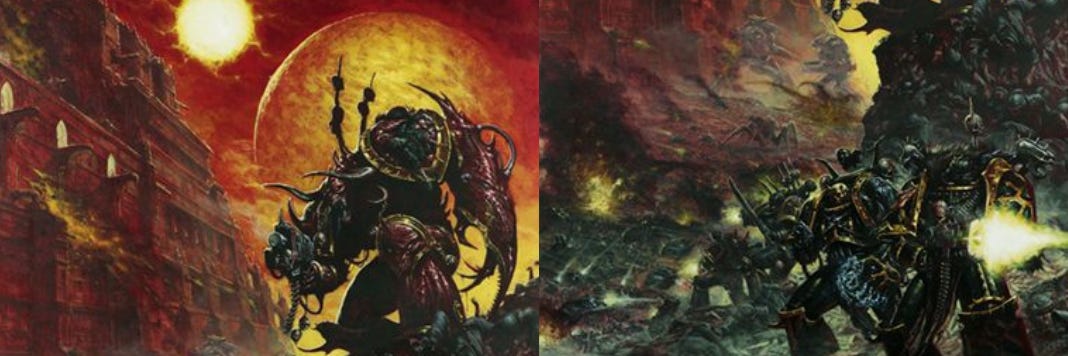
I suppose it will be the same for our society? Our world is held on the backs of men like Rouboute Guilleman. Those competent, loyal, and myopic souls who the internet likes to call “Boomers” are the only reason why anything still works, and the only reason the regime can still maintain its legitimacy. Until they look outside and see that the dream of old America has long since passed, the new world can’t begin in earnest. So what will it take? Will it require things getting as bad as Brazil? As bad as South Africa? As bad as Haiti? The depths of Calth are still a long way off.
To close, I should say that Abnett’s Know No Fear is not entirely depressing in its narrative. It closes on a note of hope.
Because, love him or hate him, Rouboute Guillman’s credulity is not limitless. “Mark Zero” comes, the Primarch finds his proof of malice, and issues an order to the few remaining loyal survivors, human or Astartes, to stand and fight back against the traitors. Here is the moment that marks Calth in infamy, not as the site of a massacre, but as the beginning of resistance.
Though the Ultramarines are unaware, the Hourus Heresy is already well underway by the time the first shot is fired on Calth. Already several sneak attacks have been launched, each catching the loyalists totally unaware, resulting in a total massacre, resistance occurring only in pockets easily quashed by the Warmaster’s forces, entire loyalist legions obliterated in the wake of the traitor’s onslaught.
At this point, in the war, it’s not even apparent that there will be much of a war to speak of. Are the loyalists too blind, too complacent, too out of position to even stand against the heretics in a meaningful way? Are the “Emperor’s lapdogs” just too coddled and deceived by the false promises of progress to understand how to wage a war once the tide turns and they find themselves battling against a superior force of other Space Marines? Was the Imperium just a paper tiger, ready to be wiped away the second a military force tested its foundations with guns instead of words?
Calth proved definitively that this would not be the case.
The Emperor still holds the loyalty of many men and women, despite his previous lies. And the denizens of the Imperium are willing to fight and die to preserve the civilization that they forged through their effort.
On Calth, most of the military cohort is dead, the once strong fortress world is smashed, it’s previously hospitable surface irradiated, and the majority of its population massacred. But that doesn’t matter.
When Guillman issues his order, backs straighten, lips stiffen, and heels dig in. This is the turning point. From this moment forward the enemy will need to fight. They will now understand that every inch forward will be purchased in with traitors’ blood, that any step back will be pursued by loyalist vengeance, and that the lives of the remaining survivors will be sold dearly.
On Calth the massacre ended, the war began, and a new harsher more honest civilization was forged at the last possible moment before total defeat.
Obviously, we are nowhere near such a turning point in our own time. As much as we might lament the circumstance, the old world is dead. And the new world can’t begin as long as we are in the pattern of denial. So we wait for our own “Mark Zero”, watching our continuing infrastructure and societal collapse go on daily, waiting for a revelation to reach those who control its levers.
I think the root of our anxiety is the absence of a life-line to look towards. When we read of restorations in history or fiction, be they Dune, The Lord of the Rings, or the re-emergence of civilization after the fall of Rome, they always derive from a focal point of belief: a king, a prophet, a revival, or the emergence of a new faith.
After all, All war is religious war. And all ages are characterized by their dominant piety. That element of true religious emotion that wells up from within a collective is the kernel that brings the other societal components together. Mankind finds God in a foxhole, and only with His help is able to forge civilization anew.
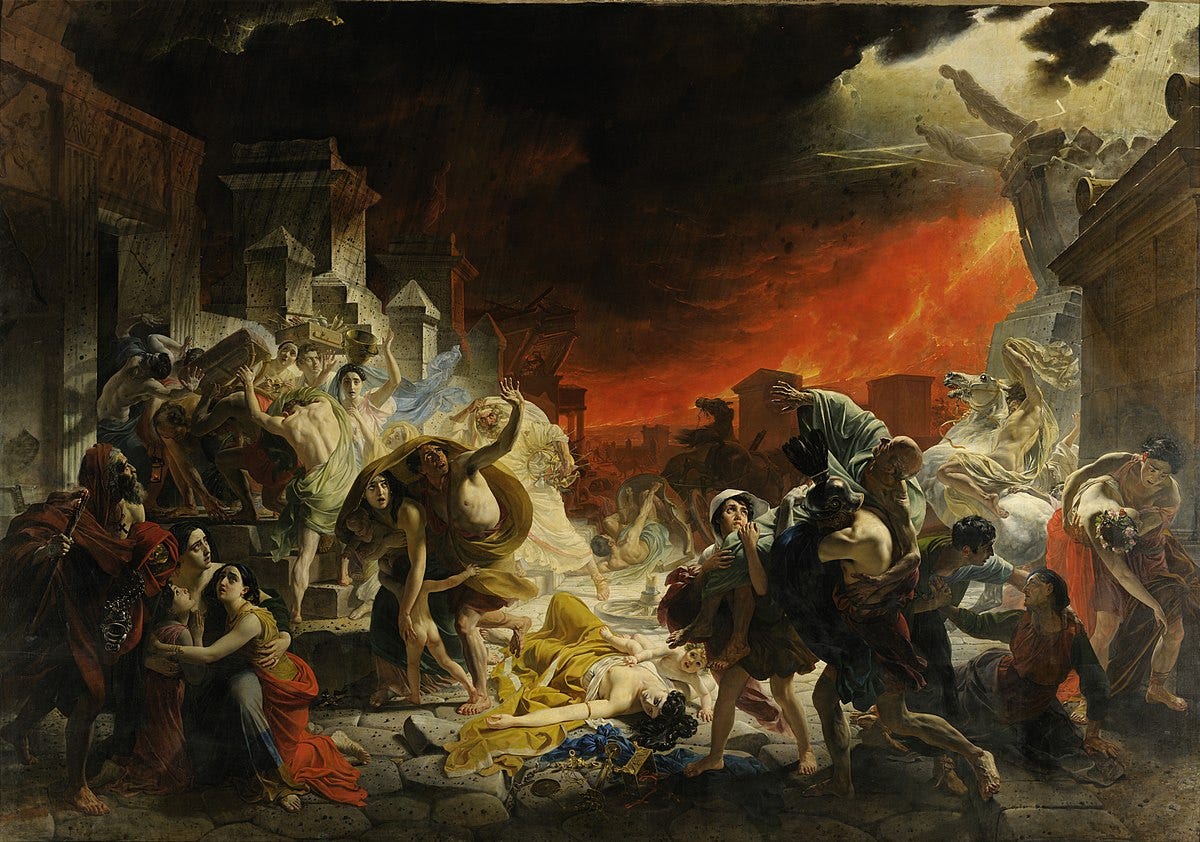
Many say modern people can’t feel real religious emotion. But that’s not true. The comforts afforded by contemporary life just provide us with very few opportunities to have genuine spiritual experiences. Nevertheless, inside every mini-disaster, in every disturbing headline we read while doom-scrolling, and in the growing anxiety felt everywhere, there is an opportunity for faith. Because the spark of belief emerges in those moments when we feel fear grip our souls and we need something greater to look towards.
Anxiety and hardship disrupts the petty assurances that we cling to ordinarily, and reduces us to a level of pure spirit. This probably does little for developing a mature religious conviction, much less a collective ethos on which to build a civilization. Nevertheless it is a beginning.
And as the headlines grow darker, I try to look for that golden thread floating in the darkness which leads towards a better tomorrow, the sacred story that makes things look hopeful, and the spiritual center where we can exist in our most desperate moments where the fear that would otherwise consume us passes us by, unacknowledged and unknown.